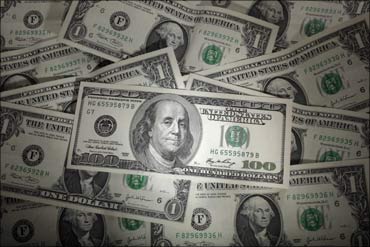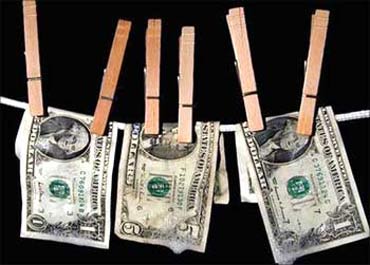Photographs: Reuters M R Venkatesh
At the height of the Bofors scandal, one distinctly remembers that a Swiss bank account code-named 'Rajiv' made it to the headlines.
The then opposition was jubilant that it had 'caught' the then prime minister of the country and the President of the Congress Party, Rajiv Gandhi, by the scruff of his neck.
Not to be flummoxed, the Congress party pointed out that Rajiv in Sanskrit meant Lotus -- the election symbol of the Bharatiya Janata Party. And since then both these parties have been accusing the other of doing precious little, forgetting that either one of them could have settled the issue.
No wonder, the identity of the owners of this account remains a mystery to this date and the nation none the wiser.
Why this reference now to an issue which is well over two decades old? Anchors, news editors and senior commentators in national channels over the past few days have virtually been claiming that it is a matter of time that we would get details of Indians having bank accounts in tax havens, notably in Switzerland.
. . .
Do politicians really want to bring black money back?
Photographs: Reuters
In fact a complacent nation has been led to believe that the list would contain names, father's name, name of spouse(s), addresses, Permanent Account Number, passport numbers and other details of such account holders.
Innocent anchors in the media, especially electronic, are guilty of raising expectations of a gullible nation without realizing how these accounts operate.
Naturally, a reference to Bofors itself would be in order. Recall how India in the Bofors case has not been able to trace the ultimate beneficiaries simply because of the secrecy associated with these bank accounts in Switzerland even two decades after the pay-offs were made?
All that is known after approximately two decades of painstaking investigations by some of the best minds in the country is that the money was deposited in numbered accounts in Switzerland: 5A5151516L and 5A5151516M. Beyond this, not much is known officially.
The idea of multilayering
Explaining the structuring of these accounts, John Christensen, director of the global Tax Justice Network and a leading authority on secrecy jurisdictions, comments, "The majority of illicit financial flows are transacted via complex structures involving legal entities operated by intermediaries working in a variety of secrecy jurisdictions."
. . .
Do politicians really want to bring black money back?
Photographs: Reuters
"This is a world of smoke and mirrors, where a typical tax evasion strategy might begin with an offshore trust created in Mauritius, which acts as sole shareholder of an offshore company registered in the Isle of Man using nominee directors and shareholders, with the Isle of Man company serving as the front for a secret bank account in Zurich, Switzerland," he adds.
Therefore, according to him, the ultimate beneficiaries of this structure will very probably have no apparent connection with the trust, the company or the bank account, and the entire structure.
Obviously this is designed to frustrate any probable investigation. Even if investigators are able to penetrate these hidden structures, Christensen explains how identifying the ultimate beneficiary of these accounts is not a straightforward affair.
All sorts of reasons are offered to justify these devices, including avoidance of political risk and succession management, but tax evasion is almost invariably an outcome of these actions.
Swiss banks are actively engaged in providing the enabling mechanisms for dodging taxation. In the Indian context it would also include parking of ill-gotten wealth.
. . .
Do politicians really want to bring black money back?
Photographs: Reuters
Given this paradigm, I am sceptical of our ability to get even the names -- forget the money.
No wonder political parties in India are nonplussed by these developments. The reasons for the same is not far to seek.
Assume that WikiLeaks reveals the name of the account holder -- which would probably be a code name or that of a trust or a company with several layers of beneficial owners, one is not sure whether it is possible to link the same to anyone in India, much less a politician. And even when it is linked, one can always disown it!
But there is an exception to this. Writing a column in The New Indian Express on January 3, 2011, titled 'Zero Tolerance, Secret Billions', S Gurumurthy, one of India's well-known chartered accountants and an expert on these matters, pointed out to the expose of over a dozen Third World politicians contained in Schweizer Illustrierte, in its issue dated November 19, 1991, six months after the assassination of Rajiv Gandhi.
The venerable Swiss magazine alleged that approximately $2.2 billion was lying in the credit of a numbered Swiss bank account in the name of Rajiv Gandhi. As Rajiv Gandhi has been assassinated by then, there could be no possible denial or verification.
. . .
Do politicians really want to bring black money back?
Photographs: Reuters
Similarly, Dr Yevgeniya Albats, the author of The State Within a State: KGB and Its Hold on Russia, too has pointed out to the payments by the KGB to several prominent Indians in the seventies and the eighties through such accounts.
The pro-Soviet tilt in India's foreign policy during those heady times is too well known to warrant a repetition here.
Are we an independent country?
Nevertheless, these allegations leave us with an uncomfortable question: are India's top politicians, bureaucrats, judges, industrialists, media personalities, celebrities vulnerable to blackmail?
If WikiLeaks has the details of Swiss accounts of some of our important political personalities -- it is equally possible that the ISI or the Chinese too might have it. So would the Americans as would the Russians.
If so, how independent are our policy formulations? In short, are we still an independent country?
The Swiss magazine has not carried any further story on the said numbered accounts since then. What happened to the money? Is it still lying with the Swiss bank? What have successive governments done to follow up on this story?
. . .
Do politicians really want to bring black money back?
Photographs: Reuters
Or was the reputed Schweizer Illustrierte completely wrong on this matter? If so, why is it that the government of India has not sought an official apology from the Swiss magazine, especially given the fact that the person -- a former prime minister of the country, no less -- is not around to defend his honour?
Fascinatingly, his party has been in power for eleven of the nineteen years since then. Yet, there is complete silence from the party. More interesting is the fact that in the rest of the period, his political opponents have been in power. They too remained silent when they could have easily pursued the matter.
When it comes to the tax havens, ostrich not peacock would be our national bird
What is crucial according to Gurumurthy is that this information of the late Rajiv Gandhi having a Swiss account has been in public domain for over a decade. Gurumurthy points out "A G Noorani, a well-known columnist, had reported on both Schweizer Illustrierte and Albats' exposes in Statesman.
Janata Party leader Subramanian Swamy had put out the photocopies of the pages of Schweizer Illustrierte and Albats' book on his web site along with the mail of the Swiss magazine, dated February 23, 2002, confirming that in its article of November 1991 it had named Rajiv Gandhi with a total of Swiss Franc 2.5 billion ($2.2 billion) in a secret account."
. . .
Do politicians really want to bring black money back?
Photographs: Reuters
"This was again recalled in my article in The New Indian Express (April 29, 2009) written in response to Congress president Sonia Gandhi's speech at Mangalore (April 27, 2009) declaring that, "the Congress was taking steps to address the issue of untaxed Indian money in Swiss banks," Gurumurthy writes.
Gurumurthy continues "Rajinder Puri, a reputed journalist, has also earlier written on the KGB disclosures in his column on August 15, 2006. Recently, in India Today (December 27, 2010) the redoubtable Ram Jethmalani has referred to the Swiss expose, asking where is that money now?
Yet the Congress has not reacted to these allegations to this date. It has maintained a stoic silence -- except for the fact that the prime minister has made a tacit admission last week that bringing back the money from tax havens would a long-drawn affair!
Remember, that the prime minister at the height of the electoral battle during General Elections of 2009 had promised to get back the money within 100 days of returning to power. Or was it a promise to 'take steps' to recover the money from tax havens. One is not sure.
Yet one can understand the compulsions of the prime minister on this matter.
. . .
Do politicians really want to bring black money back?
Photographs: Reuters
While the silence of the Congress on this issue is understandable, one fails to understand why the BJP or for that matter the Communists have not gone for the jugular.
All this raises a fundamental question -- whether our polity -- the ruling coalition and the opposition are serious in attempting to bring back our looted wealth?
The enormity of the task is in stark contrast to the lackadaisical behaviour of our political parties. Given their track record till date, it is extremely difficult to believe that they are serious about this issue.
To demonstrate their sincerity -- let the ruling combine and the opposition first clear the air over the Swiss bank account in the Bofors case.
Everything else can wait -- including mock arguments by party spokespersons of all major national parties during prime time in national media.
The author is a Chennai-based Chartered Accountant. He can be contacted at mrv@mrv.net.in









article